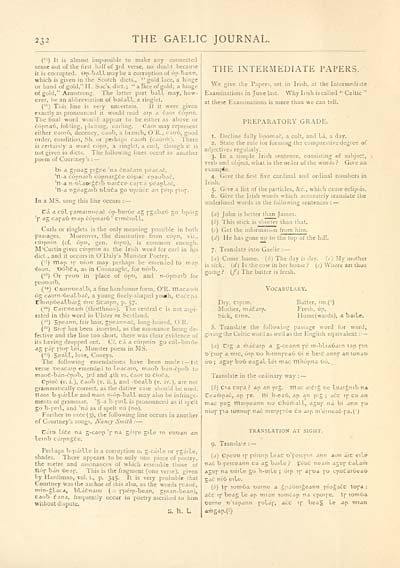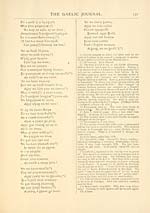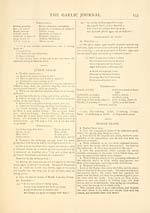Download files
Complete book:
Individual page:
Thumbnail gallery: Grid view | List view

i32
THE GAELIC JOURNAL.
(■') It is almost impossible to make any connected
sense out of the first hp.lfofjid verse, no doulit because
it is corrupted. Oi\-biLLmaybe a corruption of óiìbûnn.
which is given in the Scotch diets., "gold l.ice, a hinge
or band of gold," H. Soc's. diet. ; " a lace of gold, a hinge
of gold," Armstrong. The latter part h&\X may, how-
ever, be an abbreviation of bic<\tL, a ringlet.
(") Tliis line is veiy uncertain. 11 it were given
exactly as pronciuiced it would read aii\ a c.\oi có]miú.
Tlie final word would appear to be either as above ur
cóptia-D, folding, jlaiting, curling. Caoi may represent
either cwiŵ, decency, caob, a branch, O'R., c^wẃ, good
order, condition, Sh. or perhaps cjioiti (cAoiiii). There
is certainly a word cópn, a ringlet, a curl, though it is
not given in diets. The following lines occuf in another
poem of Courtney's : —
hi A Sl^ûg pjce 'ììi cujcAm pewCAC,
'fí-ä cópnŵib cópnAigée cópic chaoIJac,
'11-A n-oLAOiJcib TJAicce caita péAi\b.-\c,
'n-A n^éj^Aib üLúcA 50 ■0]\iúcc An féip l'i'»l'.
In a MS. song this line occurs : —
CÁ A cut j-AmAiiineAc óp-bin'óe Ag i-gAbAẂ 50 bpóig
Y Ag CAfAẂ iriAJV COIMIAIU ' CltllCloLU
Curls or ringlets is the only meaning possible in both
passages. Moreover, the diminutive from copn, viz.,
ctii|\niii (cf. ü]\T), gen. iiiito), is common enough.
M'Curtin gives ciimnin as the Irish word for curl in his
diet., and it occurs in O'Daly's Munster Poetry.
('?) TtlAp 11" X)ioii may perhaps be emended to nuxp
•Dion. XJóbcA, as in Connaught, for notb.
(") Or j'eoo in place of o)™, and ti-óiroAib for
^eoüAib.
C) CAonTOealb, a fine h.indsome form, O'R. lllACAoni
05 cAoin-weAlbAc, a young finely-shaped youth, eAcr]\j
ChoiiTOCALbAiJ line ScAipn, p. 57.
{■"} CAicneAiii (thotthnoo). The central c is not aspi-
rated in this word in Ulster or Scotland.
(■') Sr^*"") f^'fiii^if» Sl^^^^'i^sjc, long-haired, OR.
(") Sioj- lias been inserted, as the assonance being de-
fective and the line too short, there was clear evidence of
its having dropped out. Cf. cÁ a ci'mMiin 50 ciiL-buiúe
A5 yS]- p'of lei, Munster poem in MS.
C) 5'^<^'^''> love, Coneys.
The following emendations have been made : — ut
verse ■oeAcaip emended to ieACAni, tiiAob bÁn-c]\ob to
tiiAOÉ"-bÁn-cpob, 3rd and 4th vs. caoi to ciocA.
C|\ioc (v. 1.), CAob (v. ii.), and -weAtb (v. iv. ), are not
grammatically correct, as the dative case should be used.
11 Aoi b-pÁiLte and riAOi ii-óp-bAbl may also be infringe-
ments ol grammar. '5-A b-^niib is pronounced as if spelt
50 b-):cil, and '11Á as if spelt mi (no).
Furiher to note (3), the following line occurs in another
of Courtney's songs, Nancy Smith : —
CÁ1T) Uce nA S-CAop ']• nA 5éi)-e giLe in eut)4n An
lemb cÁipngce.
Perhaps b-pÁillc is a corruption o. 5-cÁile or i'gÁiLe,
.shades. There appears to be only one piece of poetry,
the metre and assonances of which resemble those of
Uóf bÁn ■ôeap. This is the fraginent (one verse), given
by Ilardiman, vol. i., p. 345. It is very probable that
Courtney was the author of this also, as the w-ords j-caoc,
min-gLACA, biÁcnAiti {— fpétp-beAn, gpiAn-beAn),
CAob fAnA, frequently occur iu poetry ascribed to him
without dispute.
S. ll. I.
THE INTERMEDIATE PAPERS.
We give the Papers, set in Irish, at the Intermediite
Examinations in June last. Why Irish is called '• Celtic "
at these Examinations is more than we can tell.
PREPARATORY GRADE.
1. Decline fully buoniAC, a colt, and li, a day.
2. State the rule lor forming the compar.itive degree of
adjectives regularly.
3. In a simple Irish sentence, consisting of subject,
verb and object, what is the order of the words? Give an
example.
4. Give the first five cardinal and ordinal numbers in
Irish.
5. Give a list of the particles, &c. , which cause eclipsis.
6. Give the Irish words which accurately translate the
underlined words in the following sentences : —
(n) John is better t han James.
(/') This stick is shorter than that.
(c) Get the information from him.
(i/) He has gone up to the top of the hill.
7. Translate into Gaelic : —
{a) Come home, (i) The day is dry. (c) .My mother
issicU. (rf) Is the cow in her house? (t) Wlierc art thou
going? (/) The butter is fresh.
VOCABUL.\RY.
Dry, ci|Mm. Butter, im.(')
Mother, mÁcAip. î'resh, ù\\.
Sick, cinn. llome(waids), a biile.
S. Translate the following passage word for word,
giving the Celtic word as well as the English equivalent : —
(a) C15 A lìiÁCAip A 5-ceAiin ^-e m-bblAWAin lAp j-in
o'ỳio)* A niic, ói|\ ■oo h-iiinreA-D x>i é beic Ann)- An lonoio
vro ; Agui" but> eA^AL lei niAC lllhopnA wo.
Translate in the ordinary way : —
(/>) C1A cui'A ? &]\ An pig. Ill AC AIC15 T)c LuAigmb n*
CeAihpAc, Ap pe. Hi li-eAt), Ap ah pig ; acc ip cu An
niAC pu5 llluipoAiin -oo ChinhALl, Ajup 11Á bi Ann po
iiiop piA loiiiiop 1IAC nuiippnje cu Aip m t;ineAC-i-A.( )
TRANSLATION AT SIGHT.
9. Translate ; —
(ir) CpeuT) ip péioip IcAC ■o'peicpin Ann Aon Áic eile
nAc b-peiceAnn cu aj bAile ? peuc tieAiii Ajup caIaiu
Agup OA üiiile 50 h-uiLe; óip ip Apo* po cpucAitJeAW
5AC nit) eile.
(/<) 1p lomẂA ■ouine A gi\ÁTJuigeAiin piogAcc 1op4 :
Acc ip beAj le Ap niiAii lonicAp iia cpoipe. Ip lonitJA
Tjuine o'lApAnn polÁp, acc ip beAj le Ap miAn
Am5Ap.(5)
THE GAELIC JOURNAL.
(■') It is almost impossible to make any connected
sense out of the first hp.lfofjid verse, no doulit because
it is corrupted. Oi\-biLLmaybe a corruption of óiìbûnn.
which is given in the Scotch diets., "gold l.ice, a hinge
or band of gold," H. Soc's. diet. ; " a lace of gold, a hinge
of gold," Armstrong. The latter part h&\X may, how-
ever, be an abbreviation of bic<\tL, a ringlet.
(") Tliis line is veiy uncertain. 11 it were given
exactly as pronciuiced it would read aii\ a c.\oi có]miú.
Tlie final word would appear to be either as above ur
cóptia-D, folding, jlaiting, curling. Caoi may represent
either cwiŵ, decency, caob, a branch, O'R., c^wẃ, good
order, condition, Sh. or perhaps cjioiti (cAoiiii). There
is certainly a word cópn, a ringlet, a curl, though it is
not given in diets. The following lines occuf in another
poem of Courtney's : —
hi A Sl^ûg pjce 'ììi cujcAm pewCAC,
'fí-ä cópnŵib cópnAigée cópic chaoIJac,
'11-A n-oLAOiJcib TJAicce caita péAi\b.-\c,
'n-A n^éj^Aib üLúcA 50 ■0]\iúcc An féip l'i'»l'.
In a MS. song this line occurs : —
CÁ A cut j-AmAiiineAc óp-bin'óe Ag i-gAbAẂ 50 bpóig
Y Ag CAfAẂ iriAJV COIMIAIU ' CltllCloLU
Curls or ringlets is the only meaning possible in both
passages. Moreover, the diminutive from copn, viz.,
ctii|\niii (cf. ü]\T), gen. iiiito), is common enough.
M'Curtin gives ciimnin as the Irish word for curl in his
diet., and it occurs in O'Daly's Munster Poetry.
('?) TtlAp 11" X)ioii may perhaps be emended to nuxp
•Dion. XJóbcA, as in Connaught, for notb.
(") Or j'eoo in place of o)™, and ti-óiroAib for
^eoüAib.
C) CAonTOealb, a fine h.indsome form, O'R. lllACAoni
05 cAoin-weAlbAc, a young finely-shaped youth, eAcr]\j
ChoiiTOCALbAiJ line ScAipn, p. 57.
{■"} CAicneAiii (thotthnoo). The central c is not aspi-
rated in this word in Ulster or Scotland.
(■') Sr^*"") f^'fiii^if» Sl^^^^'i^sjc, long-haired, OR.
(") Sioj- lias been inserted, as the assonance being de-
fective and the line too short, there was clear evidence of
its having dropped out. Cf. cÁ a ci'mMiin 50 ciiL-buiúe
A5 yS]- p'of lei, Munster poem in MS.
C) 5'^<^'^''> love, Coneys.
The following emendations have been made : — ut
verse ■oeAcaip emended to ieACAni, tiiAob bÁn-c]\ob to
tiiAOÉ"-bÁn-cpob, 3rd and 4th vs. caoi to ciocA.
C|\ioc (v. 1.), CAob (v. ii.), and -weAtb (v. iv. ), are not
grammatically correct, as the dative case should be used.
11 Aoi b-pÁiLte and riAOi ii-óp-bAbl may also be infringe-
ments ol grammar. '5-A b-^niib is pronounced as if spelt
50 b-):cil, and '11Á as if spelt mi (no).
Furiher to note (3), the following line occurs in another
of Courtney's songs, Nancy Smith : —
CÁ1T) Uce nA S-CAop ']• nA 5éi)-e giLe in eut)4n An
lemb cÁipngce.
Perhaps b-pÁillc is a corruption o. 5-cÁile or i'gÁiLe,
.shades. There appears to be only one piece of poetry,
the metre and assonances of which resemble those of
Uóf bÁn ■ôeap. This is the fraginent (one verse), given
by Ilardiman, vol. i., p. 345. It is very probable that
Courtney was the author of this also, as the w-ords j-caoc,
min-gLACA, biÁcnAiti {— fpétp-beAn, gpiAn-beAn),
CAob fAnA, frequently occur iu poetry ascribed to him
without dispute.
S. ll. I.
THE INTERMEDIATE PAPERS.
We give the Papers, set in Irish, at the Intermediite
Examinations in June last. Why Irish is called '• Celtic "
at these Examinations is more than we can tell.
PREPARATORY GRADE.
1. Decline fully buoniAC, a colt, and li, a day.
2. State the rule lor forming the compar.itive degree of
adjectives regularly.
3. In a simple Irish sentence, consisting of subject,
verb and object, what is the order of the words? Give an
example.
4. Give the first five cardinal and ordinal numbers in
Irish.
5. Give a list of the particles, &c. , which cause eclipsis.
6. Give the Irish words which accurately translate the
underlined words in the following sentences : —
(n) John is better t han James.
(/') This stick is shorter than that.
(c) Get the information from him.
(i/) He has gone up to the top of the hill.
7. Translate into Gaelic : —
{a) Come home, (i) The day is dry. (c) .My mother
issicU. (rf) Is the cow in her house? (t) Wlierc art thou
going? (/) The butter is fresh.
VOCABUL.\RY.
Dry, ci|Mm. Butter, im.(')
Mother, mÁcAip. î'resh, ù\\.
Sick, cinn. llome(waids), a biile.
S. Translate the following passage word for word,
giving the Celtic word as well as the English equivalent : —
(a) C15 A lìiÁCAip A 5-ceAiin ^-e m-bblAWAin lAp j-in
o'ỳio)* A niic, ói|\ ■oo h-iiinreA-D x>i é beic Ann)- An lonoio
vro ; Agui" but> eA^AL lei niAC lllhopnA wo.
Translate in the ordinary way : —
(/>) C1A cui'A ? &]\ An pig. Ill AC AIC15 T)c LuAigmb n*
CeAihpAc, Ap pe. Hi li-eAt), Ap ah pig ; acc ip cu An
niAC pu5 llluipoAiin -oo ChinhALl, Ajup 11Á bi Ann po
iiiop piA loiiiiop 1IAC nuiippnje cu Aip m t;ineAC-i-A.( )
TRANSLATION AT SIGHT.
9. Translate ; —
(ir) CpeuT) ip péioip IcAC ■o'peicpin Ann Aon Áic eile
nAc b-peiceAnn cu aj bAile ? peuc tieAiii Ajup caIaiu
Agup OA üiiile 50 h-uiLe; óip ip Apo* po cpucAitJeAW
5AC nit) eile.
(/<) 1p lomẂA ■ouine A gi\ÁTJuigeAiin piogAcc 1op4 :
Acc ip beAj le Ap niiAii lonicAp iia cpoipe. Ip lonitJA
Tjuine o'lApAnn polÁp, acc ip beAj le Ap miAn
Am5Ap.(5)
Set display mode to: Large image | Transcription
Images and transcriptions on this page, including medium image downloads, may be used under the Creative Commons Attribution 4.0 International Licence unless otherwise stated. ![]()
| Early Gaelic Book Collections > Blair Collection > Gaelic journal > Volume 4, number 33 > (232) |
|---|
| Permanent URL | https://digital.nls.uk/79327283 |
|---|
| Description | No. 33, Vol. IV. 1889. |
|---|---|
| Shelfmark | Blair.217 |
| Attribution and copyright: |
|
| Description | A selection of books from a collection of more than 500 titles, mostly on religious and literary topics. Also includes some material dealing with other Celtic languages and societies. Collection created towards the end of the 19th century by Lady Evelyn Stewart Murray. |
|---|
| Description | Selected items from five 'Special and Named Printed Collections'. Includes books in Gaelic and other Celtic languages, works about the Gaels, their languages, literature, culture and history. |
|---|

